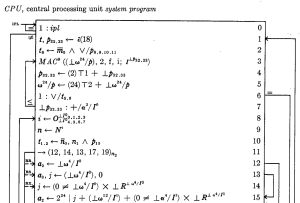Branch
→
|
Branch (→) is a special primitive with a function-like syntax which provides a way to control execution flow in an APL program. It fulfils the role of goto, return statements, and call stack unwinding in other programming languages, though it is slightly more powerful in APL.
Behaviour
Branch was the only form of flow control in early versions of APL, having been carried over from the conditional flow arrows of Iverson Notation. Some APL dialects later added the more modern control structures leading to deprecation of Branch.
Branch is unusual having syntax resembling a monadic function, but affecting program flow rather than altering arrays. In addition, a so called "naked branch" or"abort", that is, a niladic → will cut one level off the call stack.
In a tradfn, Branch can take a scalar or vector argument, and immediately cause execution to resume on the line indicated by the first element of the argument, which must be a non-negative integer. If the line number is 0, the function will return to its caller. If the argument is empty, the effect is that of consuming the argument and giving no result, equivalent to the dfn {}. Inserting a label (an identifier followed by a colon :) into a function, in a sense declares a name as a constant with the scalar value of the current number for whichever line the label occurs on. This ensures stability when lines are inserted into a function.
Dfns do not support branching except the naked branch to cut the stack.
In a tacit function (which doesn't have its own stack frame), the effect of Branch will be exercised in its caller. Tacit functions containing Branch can therefore be used to write covers for Branch, including various conditions.
Keyword alternatives
In dialects with control structures, branching can also be effected with :GoTo and specifically leaving the current function (which is normally →0) can be written :Return.
Examples
Branch function can be used to implement structured programming constructs without the use of special keywords:[1]
⍝ If-Then-Else construct
→(~B)/Else
S1
→End
Else:
S2
End:
⍝ Select construct
→(Case1, Case2, Case3, Case4)[i]
Case1: S1
→Next
Case2: S2
→Next
Case3: S3
→Next
Case4: S4
Next:
⍝ While-Do construct
While: →(~B)/Done
S1
→While
Done:
⍝ Repeat-Until construct
Repeat: S2
→(~B)/Repeat
Note that Else, End, CaseN, Next, While, Done, Repeat in the examples above are all user-defined labels rather than keywords.
External links
Tutorials
- Bernard Legrand. Mastering Dyalog APL (page 208). Dyalog Ltd. November 2009.
